Gary Sheffield has always approached the pulpit with the same hammer and tongs he takes to the plate.
Yet for all of his bat-waggling brutality and fire-breathing bluntness, Sheffield speaks in hushed tones, with a cool confidence. He knows you can't shut him up even if you wanted to.
And you don't.
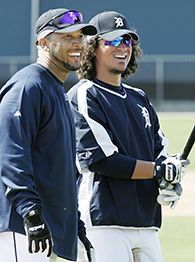
Elsa/Getty Images
With a new three-year deal from the Tigers, Sheffield is eyeing 500 career home runs ... and maybe the Hall of Fame.
This is what makes Sheffield uniquely suited to serve as a tour guide through the good, the bad, and the steroid that is modern major league baseball in his memoir "Inside Power" (Crown, April 3).
With a pen as punishing as his bat and as provocative as its proprietor, Sheffield writes about not knowing his real father, handling the finger-numbing fastballs of uncle and backyard throwing mate Dwight Gooden (and the off-field temptations that derailed his uncle's playing career), and dealing with some of the game's most feared execs -- often without the help of an agent -- during his seven-team, 19-year career inside the wicked business of baseball.
That spirit reared its head during a recent conversation about some of the topics covered in his book, including the travails of playing in pinstripes, steroids and racism in baseball, his troubled uncle's plight, and his penchant for telling the brutal truth.
Alipour: From the feedback you've gotten, what is shaping up to be the most controversial revelation in the book?
Sheffield: I think it's actually my departure from the Yankees. People think I'm bitter and angry that I left, but I was just talking about the conditions of what went on.
In the book, you give much love to your teammates, but you were quite critical of the organization, which you call "The Corporation." How do you look back on your time with the Yankees?
There's a lot of things that go on there that you don't know until you get there. I heard stories about how they're a first-class organization. That they're everything you want in playing for a team. I'm not saying they're not first-class. But I've played for teams that were family-oriented organizations. They made you feel like family. The Yankees are strictly a business. Baseball is your life and everything else is secondary.
So if a player came to you for advice on playing with the Yankees, what would you tell him?
|
|
|---|
In an excerpt from "Inside Power," Gary Sheffield addresses Barry Bonds and the steroids issue. |
If winning is everything to you, go there. If it's not, don't. If you can't handle everything else that comes with it, it's not the place for you. There are things that you have to deal with every day, until the next pitch is thrown. So I'd say, if you're not mentally strong, if you don't have a deaf ear to a lot of things, don't go there.
You write that much of that is due to the cozy relationship between the New York press and George Steinbrenner. You also call The Boss "cold-blooded" and Torre "an owner's manager," as opposed to "a players' manager." What would you tell that player about dealing with The Corporation itself?
Stay out of their way. The Corporation is bigger than any one person. It's not something you can do damage to. Just stay out of their way. As long as you protect yourself, and keep another door open, keeping in mind how many years you want to play and not leaving the Yankees as damaged goods, then you'll be fine.
You assign some blame to Joe Torre for the Yankees' quick ouster …
No, one thing I did not do is "blame." I might've said what's on my mind, but I don't blame anyone.
Well, I don't want to put words in your mouth, but in the book, you criticize Torre …
See, that's not blaming. You show me where I blamed him.
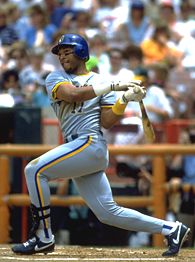
Stephen Dunn/Getty Images
Sheffield reached the majors with the Brewers in 1988 at age 19 but was traded to the Padres in 1992.
That's saying what Corporate America -- or any person in America -- saw. That when I wasn't playing and A-Rod is hitting eighth, something is wrong. If something is wrong, who writes the lineup? Joe Torre writes the lineup. I'm not really blaming. I'm telling you factual stuff.
At the moment, seems everybody is caught up in the Jeter and A-Rod dynamic. What are your thoughts on your two former teammates and their relationship?
I don't know how they were before, but in my three years there, I haven't seen a change in their relationship. As far as I'm concerned, I saw a good working relationship.
You wrote that you used anger, or "the rage," as fuel, particularly in the early stages of your career. How did anger help you? Because it was like a fight to me. When you challenge me, I like my chances in a fistfight. On the field, I use the same approach. I'm going to win. And I'll do it by any means necessary. If you're not willing to go that route, don't come my way.
You certainly approached the business of baseball that way. You've chosen to represent yourself in recent deals and you wrote vivid accounts about slamming the door on [former Dodgers chairman, managing partner, and CEO] Bob Daley and Steinbrenner. How did being "a fighter" help you in business?
It helped me because I wasn't intimidated that they had a ton of money. You can't just use me. I won't allow that. I let that be known to Daley and Steinbrenner. On the outside, people called me arrogant. But I do business aggressively to benefit me, and they do the same to benefit them, so we can find a middle ground.
As time went on, you sought what you call "The Calmness." Have you finally found that calmness?
|
|
|---|
• First-round pick (sixth overall) by Milwaukee Brewers in 1986 draft |
I found it. That's the thing. If you have that in you, nothing can trigger you. I might have dealt with things differently when I was, like, 25, but when I go through something now, I look at the source and deal with it accordingly.
You've got a reputation for expressing the brutal truth, so now that you've found The Calmness, do you have any specific regrets as a mature, calm adult?
Not at all. Because the rage was in me, and if it wasn't for the rage, then I wouldn't know how to be calm. They feed off of each other. Just like when Malcolm X fed off Martin Luther King. They needed each other.
You credit your former teammate Terry Pendleton with helping you find The Calmness through God. How did God help you?
Terry Pendleton is a guy I watched closely. Even if he'd get upset, he'd deal with it a different way. Finding God was a major step in my life. You start to understand that a lot of things happen for a reason, and you know it before they happen, and when they happen, you know exactly who to turn to and how to deal with it.
In the book, you blamed race for some management decisions -- like when the Brewers moved you to third base so Billy Spiers could play your preferred position of shortstop, and when the Marlins made Jeff Conine their "posterboy" and not you. Do you still feel race is an issue in baseball?
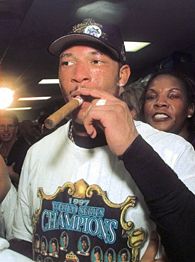
AP Photo/Rogelio Solis
Sheffield's .250 average in 1997 was the only time he hit below .290 in the past 12 seasons, but the Marlins won the World Series.
Jeff Conine is a good friend of mine, but that's an example. I've been the best player on every team that I played on, so if I can't be the poster child of your team, then what else is it? It's got to be a black-white issue. Every white player I know who's the best player on their team is the poster child of that team. But you need to know when to fight your battles. It's a part of society.
You wrote that Derek Jeter is well-liked because he's biracial. You feel that helps in the clubhouse?
It doesn't have everything to do with it. It also has to do with him being a quality person. That's what I look at first. But when a black player walks in the room, he's got to fit in with what's in there: a majority of whites. We don't ever walk in a room and already fit in. I ain't never heard of that. I've seen squeaky-clean black players walk in the room and people ask me, "What kind of guy is he?" But when a white player walks in the room, nobody ever asked me that question.
You wrote at length about your close relationship with your uncle, Doc Gooden, a man who saw his can't-miss Hall of Fame career unravel due to drug abuse. You wrote that he was never "a fighter" like yourself. How, in your mind, did that hurt him?
He got walked over. He let corporate America use him. If somebody tells you what to say and how to say it, is that really you? I was there when he was doing interviews and I saw the Mets' PR department telling him what to say. He was their poster child. He was "Doctor K." The Michael Jordan of baseball. So I studied him, and thought, "OK, when I make it, how is it going to benefit me to be told what to say? How can I go home and live with that?" He wasn't being himself. He got caught up in a character: "Doc." But he's Dwight. He became his nickname. Now, Doc is on drugs, and he's about to kill Dwight. That's what happened. I've been called "Sheff," but I'll always be Gary. That's who I am.
Speaking of, you never had a cool nickname. They riffed off the cooking show and called you "Iron Sheff" for a while, but that's kind of weak.
[Laughs] And if I let them call me that, I'd believe it, and then I'd think I could run through walls and stuff. I take it in jest, but when I get off the field, I'm back to normal.
You write a vivid account of your workout with Barry Bonds and your link to the steroids controversy. You have said that you never knowingly took steroids. But while working out with Bonds after the 2001 season, you wrote that you received some cream from his trainer Greg Anderson -- which you applied to some busted stitches -- and you also took some vitamins from Bonds, who got them from Anderson, who got them from BALCO head Victor Conte. Later, you made a check out to BALCO, linking you to this scandal forever. For the record, were those substances -- the vitamins and cream -- tainted? And if not, how can you be sure?
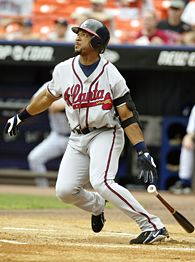
Al Bello/Getty Images
Sheffield had a monster season with Atlanta in 2003, hitting .330 with 39 home runs and a career-high 132 RBI.
I know they weren't tainted. Tell me how rubbing something on me will make you feel any different? That's the most preposterous thing I've ever heard. Tell me this: Have you ever gone to a store and had a steroid-based cream put on you?
Can't say that I have.
OK then, so are you on steroids?
No.
OK, that's my point. If it's that simple, why do I have to debate this with anyone?
You say the proof is in the photos and your numbers. What do you mean by that?
Look at McGwire and Barry's numbers. Then look at my numbers. Have they changed? No. Then look at their head sizes. Look at my cap size from when I started and where I'm at now. Has that changed? No. Look at my body from when I was a rookie. Have I changed? No. So you tell me what it is. I don't control where my name goes. You can waste your time trying to investigate me, but I'm going to keep moving forward.
How do you feel about the players who've been implicated in this mess? And do you feel that Mark McGwire and Bonds, specifically, should be in the Hall of Fame?
They were Hall of Famers yesterday, they're Hall of Famers today, they're Hall of Famers forever. Willie Mays drank red juice back in the day. Nobody said they took milk and cookies. Babe Ruth and those guys, they did stuff too. They drank coffee. You're always going to take protein shakes and multivitamins. If it's going to give you energy, why not use it? It's OK if it's legal. I have never supported the illegal use of anything. People fail to realize, I was the first person to speak about this stuff with Bryant Gumbel. I've been trying to be a spokesperson for illegal stuff. If it's illegal, why should it be in the game? Why should my kids be exposed to this if they ever decide to play baseball?
You walked out on Bonds' offseason workout due to his controlling behavior -- which included making you sleep in his house. Have you talked to him since?
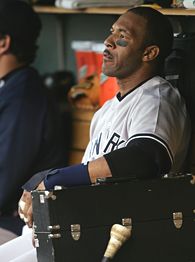
Elsa/Getty Images
After missing most of 2006, Sheffield was 1 for 12 in the ALDS against Detroit and was even benched for a game.
No, we've never run into each other. If I see him, we'll talk. We're two grown men. We've never connected, though.
You've been given a fresh start in Detroit with a manager you love in Jim Leyland. Will you finally be able to do what almost every team has promised you: Will you retire a Tiger?
[Laughs] That's a question for them. I control what I can. If I could control not playing for seven different teams, I would have. You look at my numbers, why have I been on seven different teams? Because I was a problem? I haven't been a problem except with one organization.
Your wrist is good now. But you're obviously nearing the end of your career. How much longer do you feel you can perform at a high level?
Well, I look at it like this. I'm better than I was when I first came back from my wrist injury [last season]. Going into last year, I was anxious to put up bigger numbers than I ever put up. Then I had my injury, and I had a chance to reconnect with myself. I know how close I was to saying, "This is over." Now I have another opportunity, three years, so I have a renewed energy.
Do you have a benchmark that you want to reach before you retire?
I was looking to get to 600 home runs, but I want 500 [he enters the season with 455]. I don't want to walk away until I put that number up. Other than that, it's about winning. I've done everything I've wanted to do in this game. Look at the numbers, the postseason. I have nothing to hang my head over.
Is 600 still a realistic goal?
It's possible if I stay healthy. If I'm on the field for 150 some games, that's reachable.
What's the one thing you want readers to take away from this book?
That they'd see I'm a sincere person, a likable person, and if they got to know me, they'd like me. No doubt about it.
Sam Alipour is based in Los Angeles. His Media Blitz column appears in ESPN The Magazine and regularly on Page 2. You can reach him at Sam.Alipour@gmail.com.


Comments
You must be signed in to post a comment